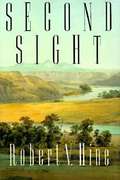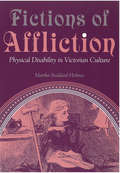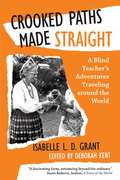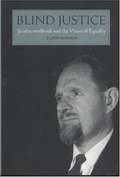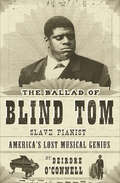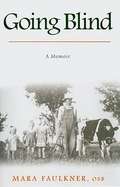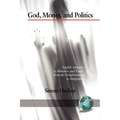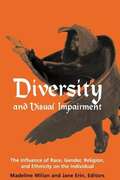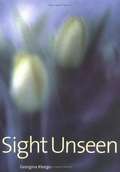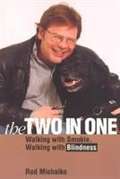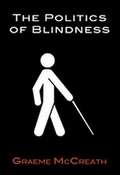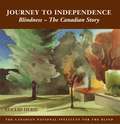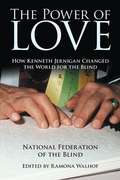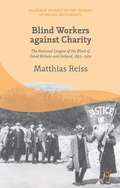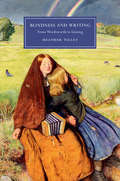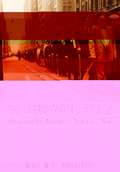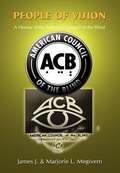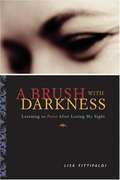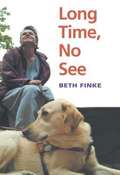Special Collections
Blindness and Visual Impairment Special Collection
Description: A collection featuring biographies, memoirs, fiction and non-fiction by and about members of the blind community. #disability
- Table View
- List View
Second Sight
by Robert V. HineThe author talks about when he goes blind, the things that happen to him, and when he regains his sight
Fictions of Affliction
by Martha Stoddard Holmes"Highly recommended . . . Holmes moves seamlessly from novelists like Charles Dickens to sociologists like Henry Mayhew to autobiographers like John Kitto. " ---Choice "An absolutely stunning book that will make a significant contribution to both Victorian literary studies and disability studies. " ---Rosemarie Garland-Thomson, Emory University "Establishes that Victorian melodrama informs many of our contemporary notions of disability . . . We have inherited from the Victorians not pandemic disability, but rather the complex of sympathy and fear. " ---Victorian Studies Tiny Tim, Clym Yeobright, Long John Silver---what underlies nineteenth-century British literature's fixation with disability? Melodramatic representations of disability pervaded not only novels, but also doctors' treatises on blindness, educators' arguments for "special" education, and even the writing of disabled people themselves. Drawing on extensive primary research, Martha Stoddard Holmes introduces readers to popular literary and dramatic works that explored culturally risky questions like "can disabled men work?" and "should disabled women have babies?" and makes connections between literary plots and medical, social, and educational debates of the day. Martha Stoddard Holmes is Associate Professor of Literature and Writing Studies at California State University, San Marcos.
Crooked Paths Made Straight
by Isabelle L. D. Grant and Deborah KentIn 1959, two years before she retired from teaching, Dr. Isabelle Grant set off on a yearlong journey around the world with Oscar, her long white cane, in her hand. She had been totally blind for the past twelve years.
In Crooked Paths Made Straight, she shares the story of her journey during which she visited twenty-three countries from Great Britain to Fiji. In Karachi, she traveled the streets by rickshaw and struggled to master the Urdu language. In India, she explored the Taj Mahal, and in Burma she slept in a room where lizards raced up and down the walls.
At a time when both women and blind people were generally seen as too helpless for solo travel, Grant fearlessly defied conventions. A dedicated teacher with a lifelong commitment to learning, her mission was to learn all she could about education in the countries she visited, in particular the education provided to blind children.
Completed in 1965, Crooked Paths Made Straight recounts Grant's journey, a story of dreams deferred that did not shrivel but sprang to life again and again.
Blind Justice
by Floyd MatsonThis is the long-awaited biography of Dr. Jacobus ten-Broek, legal scholar, UC Berkeley professor, and leader of the blind movement until his death in 1968.
Dr. Floyd Matson was a long-time collaborator with Dr. ten-Broek, authoring several books together, and perhaps the man who is most familiar with ten-Broek's work, and his life alive today. Dr. ten-Broek, pupil of Dr. Newel Perry, teacher at the California School for the Blind, was present at the creation of the National Federation of the Blind in 1940, and was its spiritual, intellectual, and political leader until ten-Broek's death in 1968.
This is a must-read for all those interested in the man at the center of a movement for over 30 years, whose legacy and inspiration is still felt today among blind activists around the world.
My Eyes Have A Cold Nose
by Hector ChevignyThe author says that when he became blind, he thought it would be a great nuissance, and indeed it was. He maintains that the greatest problem for blind people is society's fixed notions that blind people are utterly helpless and utterly tragic, and he describes how he and other blind people have dealt with this problem. One of the key parts of his rehabilitation was his training at The Seeing Eye. This book is old, but still relevant in many ways.
The Ballad of Blind Tom, Slave Pianist
by Deirdre O'ConnellThe true story of a black musical savant in the era of slavery.
Born into slavery in Georgia, Tom Wiggins died an international celebrity in New York in 1908. His life was one of the most bizarre and moving episodes in American history. Born blind and autistic-and so unable to work with other slaves-Tom was left to his own devices. He was mesmerized by the music of the family's young daughters, and by the time he was four Tom was playing tunes on the piano.
Eventually freed from slavery, Wiggins, or "Blind Tom" as he was called, toured the country and the world playing for celebrities like Mark Twain and the Queen of England and dazzling audiences everywhere. One part genius and one part novelty act, Blind Tom embodied contradictions-a star and a freak, freed from slavery but still the property of his white guardian. His life offers a window into the culture of celebrity and racism at the turn of the twentieth century.
In this rollicking and heartrending book, O'Connell takes us through the life (and three separate deaths) of Blind Tom Wiggins, restoring to the modern reader this unusual yet quintessentially American life.
Going Blind
by Mara FaulknerMara Faulkner grew up in a family shaped by Irish ancestry, a close-to-the-bone existence in rural North Dakota, and the secret of her father's blindness--along with the silence and shame surrounding it. Dennis Faulkner had retinitis pigmentosa, a genetic disease that gradually blinded him and one that may blind many members of his family, including the author.
Moving and insightful, Going Blind explores blindness in its many Permutations-within the context of the author's family, more broadly, as a disability marked by misconceptions, and as a widely used cultural metaphor. Mara Faulkner delicately weaves her family's story into an analysis of the roots and ramifications of the various metaphorical meanings of blindness, touching of the Catholic Church of the 1940s, and 1950s, Japanese internment, the Germans from Russia who dominated her hometown, and the experiences of Native people in North Dakota.
Neither sentimental nor dispassionate, the author asks whether it's possible to find gifts when sight is lost.
God, Money, and Politics
by Simon HayhoeHayhoe follows the British progression of the blind as immoral, to the need for rehabilitation, to questions of an educational nature.
Diversity and Visual Impairment
by Madeline Milian and Jane N. ErinA scholarly collection of insightful essays which look at how visual impairment interacts with certain social characteristics to affect human personalities.
The Community of the Blind
by Yoon Hough KimDr. Kim has investigated the validity of the widely-held view that while there are a large number of blind persons whose social lives are centered in the mainstream, that is with sighted persons, there are an equally large number of blind persons whose social lives are restricted mainly to other blind persons.
Sight Unseen
by Georgina KleegeThis elegantly written book offers an unexpected and unprecidented accout of blindness and sight. Legally blind since the age of eleven, Georgina Kleege draws on her experiences to offer a detailed testimony of visual impairment - both her own view of the world and the world's view of the blind. "I hope to turn the reader's gaze outward, to say not only 'Here's what I see' but also "here's what you see,' to show what's both unique and universal," Kleege writes.
Kleege describes the negative social status of the blind, analyzes stereotypes of the blind hat have been perpetuated by movies, and discusses how blindness has been portrayed in literature. She vividly conveys the visual experience of someone with severely impaired sight and explains what she cannot (and how her inability to achieve eye contact - in a society that prizes that form of connection - has affected her).
Finally she tells of the various ways she reads, and the freedom she felt when she stopped concealing her blindness and acquired skills, such as reading braille, as part of a new blind identity.
The Two-In-One
by Rod MichalkoWhen Rod Michalko's sight finally became so limited that he no longer felt safe on busy city streets, he began to search for a guide.
The Politics of Blindness
by Graeme MccreathThis book provides a rallying cry so that the voice of users of services can be heard, and both the provision of services can be tailored by and shaped to their needs.
The anti-discrimination clause, which I was proud to contribute to in the extension of the Disability Discrimination Act, the creation of the Disability Rights Commission (now part of the Equality and Human Flights Commission) and the Office of Disability inside UK government, has enabled individual and collective experience of inequality and discrimination to be tackled head on.
Undaunted by Blindness
by Clifford E. OlstromThe purpose of this book is to provide concise biographical information about four hundred notable blind persons. The people in this volume are but a small sample of the many thousands of notable blind persons in history.
The Conquest of Blindness
by Henry Randolph LatimerThe term "Conquest of Blindness" is taken to include any preventive, remedial, educational, rehabilitating, or relief phase of work pertaining to the handicap of blindness.
The primary aim of the volume is to lift work for the conquest of blindness out of the miasma of alms and asylums into the more wholesome atmosphere of social adjustment.
Other aims of the volume are to serve as a supplementary text for the use of the profession, and as an incentive to the chance reader to delve more deeply into the subject, and to present as modestly as may be the autobiography of one blind person who has contributed in small measure toward the conquest of blindness.
The Journey to Independence
by Euclid HerieThe Canadian National Institute for the Blind (CNIB) has sought to improve the lives of generations of blind Canadians. Established in 1918, this philanthropic organization has guided blind people out of a time of poverty and abuse, bringing them the same rights and freedoms as all Canadians.
This book explores the history of the CNIB - from the men who crafted its charter to the people who have made it so successful. Millions of Canadians have been touched by the services it provides or by its message of hope. The CNIB has left a legacy in Canada’s legislative, judicial, and cultural fabric, and it is a history that must be told.
The Power of Love
by National Federation of the BlindThe Power of Love: How Kenneth Jernigan Changed the World for the Blind shares the voices of a collection of individuals whose writings reveal the deep truth that serves as the foundation for the life and work of Kenneth Jernigan.
His life and their writings together speak of how Thomas Jefferson's self-evident truths imply that equality extends to embrace blind people just as surely as this country has come to understand equality's inclusion of all people regardless of the color of their skin.
Ramona Walhof, editor of The Power of Love and longtime friend of Kenneth Jernigan, draws together the distinctive voices of individuals who knew Kenneth Jernigan and whose lives he touched through his work with the National Federation of the Blind. Each of the reflections begins with a brief biographical sketch that introduces the chapter's author and ties his or her life to Kenneth Jernigan and his work.
The book concludes with a chapter, "Blindness: The Federation at Fifty," a retrospective written by Kenneth Jernigan himself in the last decade of his life. The Power of Love: How Kenneth Jernigan Changed the World for the Blind gathers a polyphonic chorus of voices that tell how the power of love, coursing through the life of Kenneth Jernigan, changed the world for the blind and, in so doing, changed the world for everyone.
From Homer to Helen Keller
by Richard Slayton FrenchFrom Homer to Helen Keller, Homer stands for the greatest achievement of the blind in the times antecedent to their systematic education. He stands for all those bards, many of them blind or blinded, creators of literature and makers of our language, who through ballads, always of great vigor and sometimes of surpassing beauty, have handed down to us the glorious traditions of far-off heroic times.
Miss Keller stands for the supreme achievement of education. The blind claim her, but the deaf can claim her, too, and modern education can claim her more than either--and all humanity claims her with the best claim of all. For she is the epitome of all that is best in humanity, all that is most spiritual; and all this through conscious aim and directed effort, through education in its best sense.
Blind Workers against Charity
by Matthias ReissThe National League of the Blind was the first radical self-represented group of visually impaired people in Britain, with branches in every part of the United Kingdom. Founded in 1893, it registered as a trade union in 1899 and still exists today as part of the trade union 'community'.
From the very beginning, the League campaigned vehemently to make the state solely responsible for providing training, employment and assistance for the visually impaired as a right. It also fought for the abolition of all charitable aid for blind people and better wages and working conditions in workshops, as well as other issues such as travel or tax concessions.
This book is the first critical study on this unique social movement organisation. It explores the League's multifaceted character, its campaign for 'direct state aid,' its relationship with the trade union movement and the Labour Party, and its impact on the British welfare state.
No Sight - Great Vision
by J. W. WilsonThis text provides a history of the Association for the Blind in Australia.
Cambridge Studies in Nineteenth-Century Literature and Culture
by Heather TilleyIn this innovative and important study, Heather Tilley examines the huge shifts that took place in the experience and conceptualisation of blindness during the nineteenth century, and demonstrates how new writing technologies for blind people had transformative effects on literary culture.
Considering the ways in which visually-impaired people used textual means to shape their own identities, the book argues that blindness was also a significant trope through which writers reflected on the act of crafting literary form.
Supported by an illuminating range of archival material (including unpublished letters from Wordsworth's circle, early ophthalmologic texts, embossed books, and autobiographies) this is a rich account of blind people's experience, and reveals the close, and often surprising personal engagement that canonical writers had with visual impairment.
Drawing on the insights of disability studies and cultural phenomenology, Tilley highlights the importance of attending to embodied experience in the production and consumption of texts.
Veterans with a Vision
by Serge Marc DurflingerDurflinger (history, the University of Ottawa, Canada) chronicles advocacy by Canadian servicemen blinded in war, highlighting their efforts to help Canadian veterans and all blind citizens. The book begins with the establishment of the Canadian National Institute for the Blind in 1918 by 200 Canadian servicemen blinded in WWI, then continues with the formation of the Sir Arthur Pearson Association of War Blinded, which advocated for government benefits, job retraining, and other social programs. Key figures are profiled, and issues such as physical and psychological rehabilitation are discussed. The book is based on archival material from both organizations.
People of Vision
by James J. Megivern and Marjorie L. MegivernPeople of Vision: A History of the American Council of the Blind. The history of the treatment of individuals who are blind by other members of society is fraught with misconceptions, prejudices, myths, and stereotypes.
There are those who believe that blind people are OK as long as they stay "in their place," removed from society. Others feel that blind individuals are helpless and hopeless, deserving only of charity and pity. Still others have the notion that all blind people can be taught certain skills which make them unusually suited to a few specific jobs. The idea that people who are blind are first of all people, capable of and deserving the opportunity to be fully assimilated, fully participating members of society as equals has gained some recognition in certain parts of this country but still has a long way to go.
A Brush With Darkness
by Lisa FittipaldiWhen Lisa Fittipaldi went blind at the age of forty-seven, she descended into a freefall of anger and denial that lasted for two years. In this moving memoir, she paints a vivid picture of the perceptual and emotional darkness that accompanied her vision loss, and her arduous journey back into the sighted world through mastery of the principles of art and color.
Long Time, No See
by Beth FinkeLong Time, No See is certainly an inspiring story, but Beth Finke does not aim to inspire. Eschewing reassuring platitudes and sensational pleas for sympathy, she charts her struggles with juvenile diabetes, blindness, and a host of other hardships, sharing her feelings of despair and frustration as well as her hard-won triumphs. Rejecting the label "courageous," she prefers to describe herself using the phrase her mother invoked in times of difficulty: "She did what she had to do." With unflinching candor and acerbic wit, Finke chronicles the progress of the juvenile diabetes that left her blind at the age of twenty-six as well as the seemingly endless spiral of adversity that followed. First she was forced out of her professional job. Then she bore a multiply handicapped son. But she kept moving forward, confronting marital and financial problems and persevering through a rocky training period with a seeing-eye dog. Finke's life story and her commanding knowledge of her situation give readers a clear understanding of diabetes, blindness, and the issues faced by parents of children with significant disabilities. Because she has taken care to include accurate medical information as well as personal memoir, Long Time, No See serves as an excellent resource for others in similar situations and for professionals who deal with disabled adults or children.
